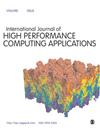科学数据有损压缩比的黑箱统计预测
IF 3.5
3区 计算机科学
Q2 COMPUTER SCIENCE, HARDWARE & ARCHITECTURE
International Journal of High Performance Computing Applications
Pub Date : 2023-05-15
DOI:10.1177/10943420231179417
引用次数: 2
摘要
在科学研究中越来越多地采用有损压缩器,处理来自实验或并行数值模拟的大量数据,并促进数据存储和移动。与无损压缩中的熵的概念相反,科学数据的有损压缩性没有理论的或基于数据的量化。用户依靠试错来评估有损压缩性能。作为一项强大的数据驱动的量化科学数据集的有损压缩性的努力,我们提供了一个统计框架来预测有损压缩器的压缩比。我们的方法是一个两步框架,其中(i)计算与压缩机无关的预测因子,(ii)根据观察到的压缩比训练依赖于这些预测因子的统计预测模型。提出的预测器利用空间相关性以及熵和损耗的概念,通过量化熵。我们在6个科学数据集上研究了8个以上的压缩机,并实现了小于12%的中位数百分比预测误差,这比其他方法的预测误差要小得多,同时在搜索特定压缩比时实现了至少8.8倍的加速,在从集合中确定最佳压缩机时实现了7.8倍的加速。本文章由计算机程序翻译,如有差异,请以英文原文为准。
Black-box statistical prediction of lossy compression ratios for scientific data
Lossy compressors are increasingly adopted in scientific research, tackling volumes of data from experiments or parallel numerical simulations and facilitating data storage and movement. In contrast with the notion of entropy in lossless compression, no theoretical or data-based quantification of lossy compressibility exists for scientific data. Users rely on trial and error to assess lossy compression performance. As a strong data-driven effort toward quantifying lossy compressibility of scientific datasets, we provide a statistical framework to predict compression ratios of lossy compressors. Our method is a two-step framework where (i) compressor-agnostic predictors are computed and (ii) statistical prediction models relying on these predictors are trained on observed compression ratios. Proposed predictors exploit spatial correlations and notions of entropy and lossyness via the quantized entropy. We study 8+ compressors on 6 scientific datasets and achieve a median percentage prediction error less than 12%, which is substantially smaller than that of other methods while achieving at least a 8.8× speedup for searching for a specific compression ratio and 7.8× speedup for determining the best compressor out of a collection.
求助全文
通过发布文献求助,成功后即可免费获取论文全文。
去求助
来源期刊
CiteScore
6.10
自引率
6.50%
发文量
32
审稿时长
>12 weeks
期刊介绍:
With ever increasing pressure for health services in all countries to meet rising demands, improve their quality and efficiency, and to be more accountable; the need for rigorous research and policy analysis has never been greater. The Journal of Health Services Research & Policy presents the latest scientific research, insightful overviews and reflections on underlying issues, and innovative, thought provoking contributions from leading academics and policy-makers. It provides ideas and hope for solving dilemmas that confront all countries.

 求助内容:
求助内容: 应助结果提醒方式:
应助结果提醒方式:


